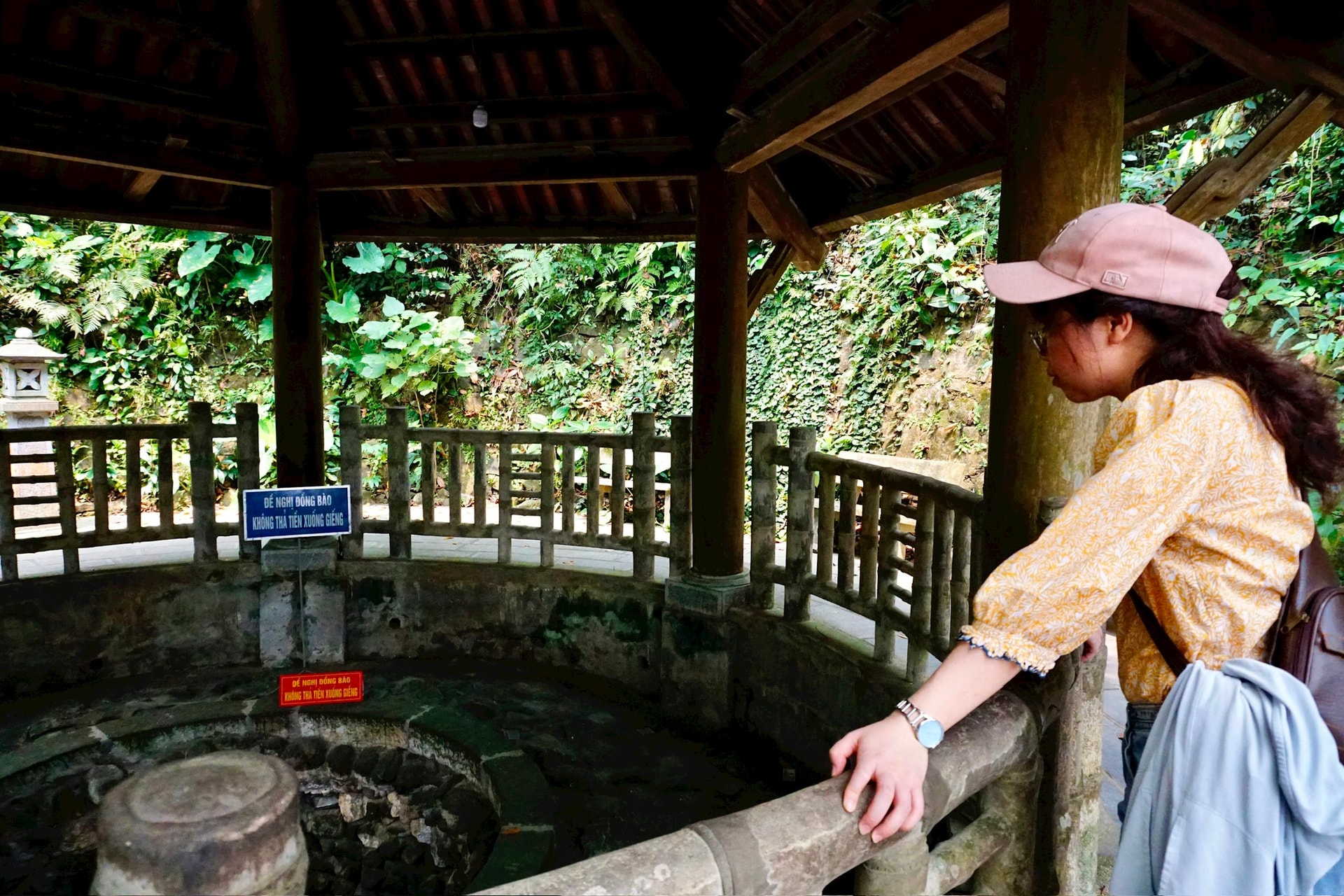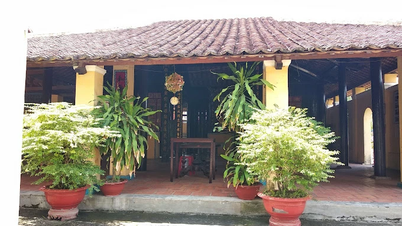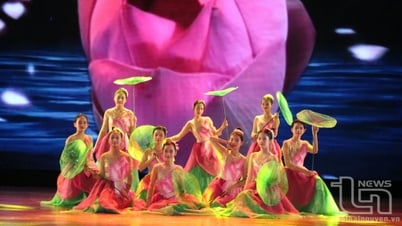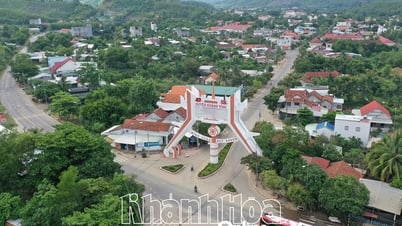
VISIT NGOC WELL AT HUNG KINGS TEMPLE
By the well I sit listening to the leaves fall
Deep in my heart I hear the sound of time
I sat by the well listening to the wind.
Turn each page of history to open the country.
By the well I sit listening to the soul of water
Trees whisper stories of the ancient times
A blue sky captured in a jade ring
See the vast territory of Van Lang.
The sound of the king playing the conch shell echoed in the city.
Urge the elephant to plow slowly back to the sunset
Seeing the princess finished her work, she sat combing her hair.
Smile with green mirror and rosy cheeks.
I lean on moss worn away by stone
Oh princess of Phong Chau land
Looking in the mirror: that piece of my heart
The Jade Well is still here, but where is the jade person?
Love the country that has been trampled by enemies many times
Still the clear blue sky
In the blue sky, the Jade well is also clear blue
I vow to keep this mirror forever.
Looking through the future generations of heroes.
BANG SY NGUYEN
Bang Sy Nguyen is a famous poet of Vietnam, he is the younger brother of poet Bang Ba Lan who appeared in the New Poetry movement. Many of his works have reached readers and left a deep impression such as: On the land of love (1966), Now we pick fruit (1972), The girl of Bac Son (1973)...
"Visiting the Ngoc Well of Hung Temple" by Bang Sy Nguyen, extracted from the Hung Temple Poetry Collection, is a poem imbued with national pride, gratitude to the origin and belief in the future of the country. Through the image of the Ngoc Well, the author skillfully evokes historical memories, the heroic traditions of our ancestors and conveys the desire to protect the eternal cultural values of the country.
Right from the beginning of the poem "Visiting the Ngoc Well at Hung Temple", the reader can feel the sacred space of the Ancestral Land. Ngoc Well is not only a famous scenic spot but also a symbol of eternity, a place where the spiritual energy of thousands of years has been deposited. Therefore, the poetic and emotional images have stirred the reader's heart right from the first words:
By the well I sit listening to the leaves fall
Deep in my heart I hear the sound of time
I sat by the well listening to the wind.
Turn each page of history to open the country
The seven-word verse in the first stanza is reminiscent of Tang poetry, full of nostalgia, anxiety, and torment. The image of the lyrical character sitting by the well, quietly feeling the movements of nature - falling leaves, the wind blowing. It is not only the sound of all things, of what is happening around reality, but also an echo from the past, from the heroic pages of the nation's history. The verse "turning each page of history to open the country" evokes the connection between the present and the past, as if history is opening up before the eyes of the next generation, making readers emotional about the time when King Hung founded the country.
In the next stanza, the image of nature blends with the national spirit, highlighting the sacredness of the land and sky where Hung Temple is located. The soul of the country is a story that is both heroic, majestic and imbued with spiritual colors, settling through layers of time about a mysterious Van Lang realm. The grass and trees that appear also seem to carry within them stories from the Hong Bang period, whispering about the historical events of the nation. The image of "the blue sky falling into a jade ring" evokes the vastness of the land and sky but also contains the beauty of condensation, the quintessence of the sacred soul of the mountains and rivers, about an ancient period of national founding:
By the well I sit listening to the soul of water
Trees whisper stories of the ancient times
A blue sky captured in a jade ring
See the vast land of Van Lang
It turns out that the Gieng Temple is like a "jade ring", sparkling and eternal on earth. Through this poem, author Bang Sy Nguyen recreates the heroic images and glorious feats of our ancestors in the early days of nation building. From the majestic presence of Van Lang to the image of King Hung blowing the conch and plowing, the innocent princess working in the fields, combing her hair and "smiling with a green mirror and rosy cheeks" have contributed to affirming the harmonious feelings and deep attachment between the king and the people. Through that, the poetic images that appear have vividly depicted the beauty of the lives of our ancestors, honoring the beautiful and noble tradition of labor to build the nation:
The king's face was heard playing the conch shell.
Urge the elephant to plow slowly back to the sunset
Seeing the princess finished her work, she sat combing her hair.
Smile with green mirror and rosy cheeks
After the moment of recreating the life of King Hung during the founding of the country, from the present moment, the author expresses nostalgia, wistfulness, and feelings through his heart to turn to the past with a feeling of nostalgia and regret. Time passes, the Jade Well remains intact, but the people of the past and history have now faded away. The verses are like a call back to the past, filled with sadness, also a reminder for today's generation not to forget the merits of their ancestors. "The Jade Well is still here, where are the jade people?" is an unanswered question, respectful and sacred, surging and blurting out like a sigh, an endless regret.
The poem ends with verses expressing the determination and strong belief of the next generation in the future of the country. That aspiration turns into the eternal, clear blue sky imprinted in the heart of the Jade well - the soul of the past of our ancestors to sing loudly, "shining through the future of generations of heroes":
Love the country that has been trampled by enemies many times
Still the clear blue sky
In the blue sky, the Jade well is also clear blue
I vow to keep this mirror forever.
Looking through the future generations of heroes.
"Visiting Ngoc Well at Hung Temple" is not only a poem describing the natural beauty of the land of the ancestors, but also a reminder for today's generation to have the responsibility to protect and promote the traditions of their ancestors, to be proud and aspire for a sustainable future of the country. With profound ideological values, emotional poetic language and evocative nuances, the work leaves beautiful impressions in the hearts of readers, making us believe more in and cherish the values of our roots.
LE THANH VANSource: https://baohaiduong.vn/gieng-ngoc-den-hung-tham-tham-tam-guong-trong-408565.html


![[Photo] Prime Minister Pham Minh Chinh starts construction of vital highway through Thai Binh and Nam Dinh](https://vphoto.vietnam.vn/thumb/1200x675/vietnam/resource/IMAGE/2025/5/12/52d98584ccea4c8dbf7c7f7484433af5)
![[Photo] Prime Minister Pham Minh Chinh receives Swedish Minister of International Development Cooperation and Foreign Trade](https://vphoto.vietnam.vn/thumb/1200x675/vietnam/resource/IMAGE/2025/5/12/ae50d0bb57584fd1bbe1cd77d9ad6d97)
![[Photo] Prime Minister Pham Minh Chinh works with the Standing Committee of Thai Binh Provincial Party Committee](https://vphoto.vietnam.vn/thumb/1200x675/vietnam/resource/IMAGE/2025/5/12/f514ab990c544e05a446f77bba59c7d1)



















































































Comment (0)